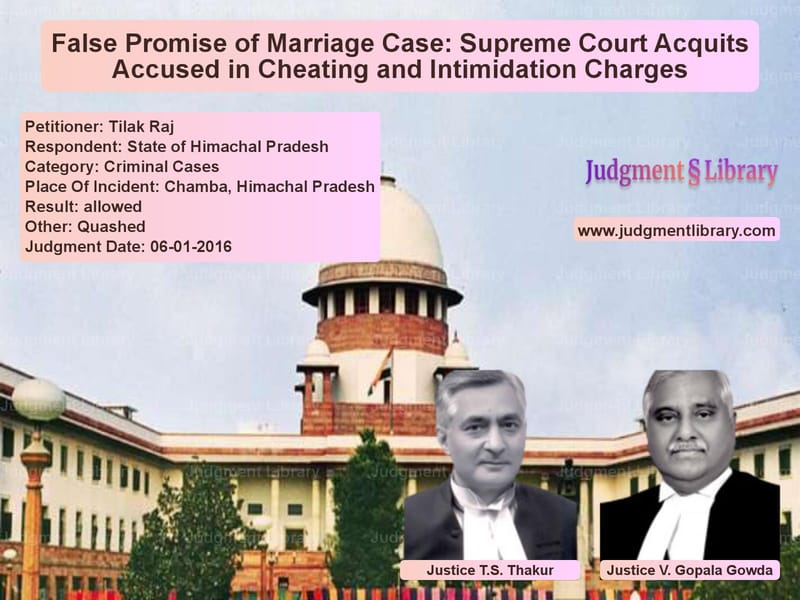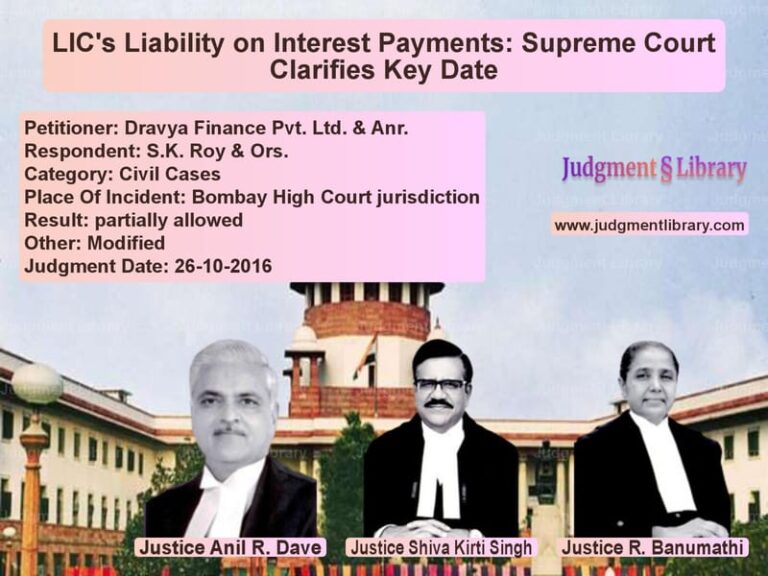False Promise of Marriage Case: Supreme Court Acquits Accused in Cheating and Intimidation Charges
The case of Tilak Raj v. State of Himachal Pradesh is a significant ruling on cases involving allegations of sexual exploitation under the false promise of marriage. The Supreme Court overturned the conviction of the appellant under Sections 417 (cheating) and 506 (criminal intimidation) of the Indian Penal Code (IPC). The ruling highlights the importance of evidence, credibility of the prosecutrix, and the necessity of proving wrongful inducement beyond a reasonable doubt.
Background of the Case
On January 6, 2010, Assistant Sub-Inspector (ASI) of Chamba Police Station, Himachal Pradesh, received a written complaint from the prosecutrix. She alleged that on January 1, 2010, the appellant, Tilak Raj, raped and physically assaulted her at her residence in Karian, Chamba. Furthermore, she claimed that when she attempted to file a police complaint the next morning, he threatened her over the phone.
According to the prosecutrix, the appellant had been in a relationship with her for two years. She alleged that he coerced her into a sexual relationship by falsely promising to marry her. However, when she sought commitment, he refused to marry her.
Registration of FIR and Investigation
The police registered FIR No. 6 of 2010 under Sections 376 (rape), 417 (cheating), and 506 (criminal intimidation) of IPC. After investigating the complaint, the police filed a chargesheet in the trial court.
Trial Court Proceedings
The case was heard by the Sessions Court, Chamba. The prosecution relied on the following evidence:
- The complainant’s statement, claiming the accused promised marriage but later refused.
- The testimony of PW-3, Yoginder Mohan, who witnessed an alleged compromise between the parties.
- Medical reports confirming that the prosecutrix had no injuries suggestive of physical assault.
The trial court, after considering the evidence, acquitted Tilak Raj of all charges, stating that the prosecution failed to establish that sexual intercourse was induced by deception.
High Court Appeal
The Himachal Pradesh government appealed against the acquittal in Criminal Appeal No. 369 of 2012. The High Court upheld the trial court’s acquittal on the charge of rape under Section 376 IPC but convicted Tilak Raj for:
- Cheating (Section 417 IPC): The High Court ruled that the accused misled the prosecutrix into a relationship under false pretenses.
- Criminal intimidation (Section 506 IPC): The court found that he had threatened the prosecutrix when she attempted to lodge a complaint.
The High Court, instead of imposing a jail term, released the appellant under Section 4 of the Probation of Offenders Act, 1958, subject to a bond of Rs. 25,000 with two sureties.
Appeal Before the Supreme Court
Tilak Raj challenged his conviction before the Supreme Court, arguing that:
- The High Court wrongly interfered with a well-reasoned trial court judgment.
- The prosecution failed to prove that his promise of marriage was false from the outset.
- There was an unexplained delay of five days in lodging the FIR, weakening the prosecution’s case.
- The non-examination of DSP K.D. Sharma, to whom the prosecutrix first reported, made the prosecution case unreliable.
- The prosecutrix was an adult government officer, aware of the consequences of her actions.
Supreme Court’s Analysis and Judgment
1. False Promise of Marriage Must Be Proved
The Court ruled that to convict an accused of cheating under Section 417 IPC, the prosecution must establish that:
- The accused made a false promise with the intention to deceive.
- The prosecutrix acted on this false promise and suffered harm.
The Court observed:
“There is no evidence to prove that the appellant induced the prosecutrix into sexual relations through a fraudulent promise of marriage.”
2. Relationship Was Consensual
The Supreme Court noted that the prosecutrix admitted to being in a relationship with the accused for two years. She allowed him to stay overnight at her residence, which indicated consent. The Court ruled:
“The relationship was consensual, and there is no material to show that the prosecutrix was deceived from the outset.”
3. No Evidence of Criminal Intimidation
The Supreme Court examined the charge under Section 506 IPC. It noted that:
- The prosecutrix’s statement regarding threats was not corroborated by independent witnesses.
- There was no material evidence proving that the accused intended to cause alarm.
The Court ruled:
“The prosecution has failed to prove that the appellant criminally intimidated the prosecutrix.”
Final Judgment
The Supreme Court overturned the High Court’s ruling and acquitted Tilak Raj of all charges. It ruled:
“There is no evidence of false inducement, and the prosecution has failed to prove cheating or intimidation beyond a reasonable doubt.”
Key Takeaways
- False promise of marriage must be proven.
- Consensual relationships do not constitute cheating.
- Hostile witnesses can weaken the prosecution’s case.
- Mere allegations of intimidation need corroboration.
Conclusion
The judgment in Tilak Raj v. State of Himachal Pradesh reaffirms that criminal convictions must be based on strong evidence. The ruling ensures that consensual relationships are not unfairly criminalized and underscores the importance of proving intent in false promise of marriage cases.
Don’t miss out on the full details! Download the complete judgment in PDF format below and gain valuable insights instantly!
Download Judgment: Tilak Raj vs State of Himachal Pr Supreme Court of India Judgment Dated 06-01-2016.pdf
Direct Downlaod Judgment: Direct downlaod this Judgment
See all petitions in Fraud and Forgery
See all petitions in Extortion and Blackmail
See all petitions in Judgment by T.S. Thakur
See all petitions in Judgment by V. Gopala Gowda
See all petitions in allowed
See all petitions in Quashed
See all petitions in supreme court of India judgments January 2016
See all petitions in 2016 judgments
See all posts in Criminal Cases Category
See all allowed petitions in Criminal Cases Category
See all Dismissed petitions in Criminal Cases Category
See all partially allowed petitions in Criminal Cases Category







